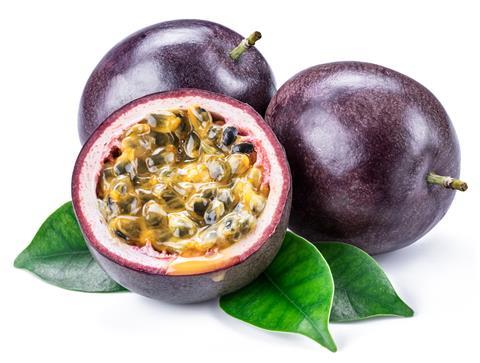As the only country able to ship the product to Europe by sea, Colombia has stolen a march on its African rivals
European demand for passion fruit is small but growing. An interest in new flavours and increasing awareness of the fruit’s health benefits – in particular its high levels of vitamins A and C – together with improved availability, are set to drive consumption in the coming years.

Figures from ITC Trade Map show the value of European imports of exotic fruit has been rising slowly but steadily over the last five years – and importantly, the market has not shown any sign of weakening despite the cost-of-living crisis.
As the world’s leading exporter of purple passion fruit, Colombia has a distinct advantage over its two nearest competitors, Kenya and South Africa, in that it is able to ship the product to Europe by sea, rather than having to rely on airfreight. This makes the fruit much more affordable.
This is why in Europe, sales of purple passion fruit – or gulupa as it is known in Colombia – are much higher than for the yellow or orange varieties (known as maracuyá and granadilla respectively) which can only be shipped by air.
According to DANE statistics, Colombia exported 15,260 tonnes of purple passion fruit worth almost US$49m in 2022, an increase of 15 per cent more on the previous year.
Pedro Pablo Díaz Pérez is manager of Jardin Exotics, Colombia’s second biggest exporter of purple passion fruit. He believes the lack of a sea freight option for yellow and orange passion fruit is a key factor stalling their consumption growth.
“There are companies that have done trial shipments, but the results have been disappointing, particularly when it comes to flavour,” he tells Fruitnet.
According to Díaz, production of the former is fairly stable in the country right now. But he believes the product has excellent potential in the main consumer markets.
“One hundred per cent of our exports go to Europe and the UK, the latter being the largest single market for purple passion fruit in the region,” he says, adding that work is also underway to open the US market.
“Jardin Exotics supplies the market through 52 weeks of the year and has done so uninterruptedly in the 10 years we’ve been operating, but due to Colombia’s bimodal rainfall regime our peak production months are November-January and June-August,” Díaz explains.
Last year the company inaugurated a new packing plant with the capacity to pack seven weekly containers of purple passion fruit in a single shift. Díaz says that by focusing on two core products, the company has been able to build up a high degree of specialisation. “As one of Colombia’s top tropical fruit suppliers, we have built up solid and lasting commercial relationships with European importers and retailers,” he says.



